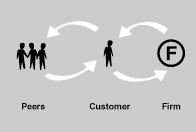RELATIONSHIP TECH
And whoever has the smartest customers wins.
The third way to make the customer smarter is by connecting customers into a collective intelligence.
When personal computers first entered the marketplace in the mid 1970s, user groups sprung up everywhere to assist the perplexed. Anyone could attend a monthly meeting and swap useful tips about how to set up a printer, or get an upgrade program to work. It was all informal, and free, and democratic; those who knew, told; those who didn’t know, asked questions and took notes. Each specific computer platform spawned local user groups in major cities. There were user groups for “orphan” equipment such as Amigas, and video game consoles, and of course for Macs and DOS-based PCs. Some user groups grew to have tens of thousands of members and some ran their own free software emporiums and had budgets in the millions of dollars.

Firms that encourage customers to talk to each other, to form affinity groups and hobby tribes, will breed smarter and more loyal customers while creating smarter products and services.
User groups were seen by the outside world as evidence of the lousy state of the computer industry. Manuals were horrible, interfaces unfriendly. Critics complained that you didn’t need to join a user group to get your TV up and running, or to turn your dishwasher on. Yet for many computer wannabees, the shared knowledge of a user group was essential in starting the journey into computerdom, or later onto the net and the web.
In reality, user groups were not a sign of failure but a sign of intelligence. They were a means of making the consumer smarter. Some computer companies caught on to this reality early and made regular visits to the bigger user groups to answer questions and hear complaints and pick up suggestions. The user group, although independent and nonprofit, became part of the computer companies’ extended self.
Today there are still some 2,000 Mac and PC user groups that offer regular meetings in the United States (and an equal number internationally). The Berkeley Mac User Group still boasts 10,000 members, and weekly meetings. Yet most user group action has shifted to the online space. Web sites with attendant conversation areas, FAQ (Frequently Asked Questions) archives, mail lists, and public bulletin boards all keep the distributed exchange of knowledge going.

